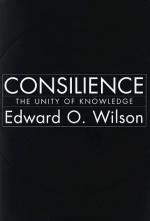|
This section contains 587 words (approx. 2 pages at 400 words per page) |

|
Consilience: The Unity of Knowledge Summary & Study Guide Description
Consilience: The Unity of Knowledge Summary & Study Guide includes comprehensive information and analysis to help you understand the book. This study guide contains the following sections:
This detailed literature summary also contains Topics for Discussion and a Free Quiz on Consilience: The Unity of Knowledge by E. O. Wilson.
Wilson develops the idea of unified learning when gaining insight into nature during his science studies. His view of the classification of species as connected with evolution is influenced by Linnaeus, who classifies animals and species into groups, families, orders and kingdoms. This ordering reminds one of the way armies are organized with platoons, armed services heading armies, and with chiefs of staff at the top.
Wilson analyzes various branches of learning, where the unification can be proved as justified and needed. The idea stems from early scientific ideas that are part of the philosophy of the Enchantment, a belief that science follows certain order while its laws are applicable in other branches. Thales of Miletus regards water as part of all matter, representing in this way a symbol of unity.
The unification of knowledge is confirmed by the material world while it is also the only choice to overcome problems that the industrialized world faces as it struggles with poverty. The unity of knowledge is the basis for learning as well as making government decisions.
Sparked by the Enlightenment, the unity of knowledge emerges as part of philosophical thought that is to foster human rights through knowledge. The knowledge that is united through rules applicable to more than just one area is based on the idea that physical laws can be applicable to other areas as well. Science and analysis leads to reasoning and seeking objective truth. Condorcet, Descartes, and Bacon develop philosophical thinking, where empirical evidence gains importance as part of discovery. Descartes uses deduction and analysis when examining each phenomenon. For him knowledge is a system of truths applicable also in mathematics. Another way to obtain knowledge is through systematic doubts. He proposes reductionism, where concepts are analyzed through separating elements that are then further analyzed in the same way. This concept stimulates the future direction of scientific research.
Scientific pursuit is based on principles of objective truth, experiments, and evidence. It consists of patches of experiments that fit hypotheses. It should be based on real truth, using various methods of research as well as various hypotheses. Science uses fundamentals that are substantial and a variety of research methods that can benefit the future. Biological sciences especially offer discoveries that expose the power of human intellect.
The complexity of the human brain represents the most challenging scientific endeavor. Its evolutionary nature involving consciousness and subconsciousness surpasses animal abilities in its propensity to analyze and use free will. It is the most complex system known in the universe which humans have failed to reproduce so far.
Genes play an important role in our evolution. They determine our behavior and the way we develop along with our culture, including our avoidance of incest.
Although artistic abilities fail to be identified by scientists, they stem from our natural environment. At first they manage to create certain order in the chaotic world. Later, common elements evolve along with our natural selection, such as myths.
One of the most important branches of learning is ethics that incorporate biology, culture, and instincts. Although a more objective analysis is needed in this area it determines the way we approach our world and the environment, deciding, ultimately, our future. All areas of learning benefit through consilience. Human evolution changes the world allowing for the volitional evolution to the detriment of our environment. Despite these advances the destruction on the earth that threatens our survival calls for urgent actions in the area of the environment that also involves ethics.
Read more from the Study Guide
|
This section contains 587 words (approx. 2 pages at 400 words per page) |

|



